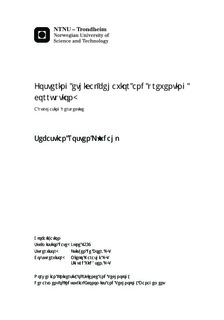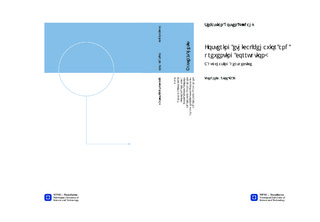| dc.description.abstract | In the view of the latest corporate scandals in Norway and increased focus on ethics and anti-corruption, the purpose of this thesis is to investigate the roles of Purchasing and Supply Management and Organizational Culture when fostering ethical behavior and preventing corruption. More specifically, this research attempts to investigate and theorize how organizations can foster ethical behavior and prevent corruption in their respective activities.
The research methodology is qualitative, and the research was conducted as a case study (ref. Yin, 2009). Moreover, the case company s practice with compliance and anti-corruption, especially in regards to their purchasing activities was analyzed. In order to do that, a literature study was carried out to explore and relate purchasing and supply management and organizational culture, in an effort to compare these findings with the observed practice.
The literature findings indicate that a holistic view of the organization and its strategic elements should be applied when preventing corruption in purchasing activities. Companies need to make sure that they have competence, performance measures, cost/benefit analyses, the necessary structure, and strategy needed to deliver the necessary changes. Fostering ethical behavior and preventing corruption is not a one-time incident, but a continuous process. The continuity is important to ensure that activities run according to the company s ethical standards, as well it is important since markets, employees, business processes, laws and regulations, along with their associated risks may change over time.
Moreover, the literature study highlighted the importance of considering the organizational culture in a company when the goal is to increase ethical behavior. The organizational culture constitutes conditions and systems that may promote ethical or unethical behavior among employees. Organizations that want to enhance their ethical culture should have clear standards (e.g. code of conducts), sufficient resources for working ethically, trust and support between lower level employees and managers, openness to discuss ethical issues, transparency throughout their activities, rewards for ethical behavior, and punishment for unethical behavior. As well, top managers must be committed and perceived as committed through the eyes of the employees.
Based on the aforementioned findings, a new framework is proposed in an attempt to theorize how companies can foster ethical behavior and prevent corruption. The findings of this thesis give some new theoretical insights to the framework.
The analysis reveals that that the observed practice of Ulstein to some extent resembles the theoretical frameworks in the organizational culture and PSM literature; however, there is room for improvements in Ulstein. The findings bring along implications for the management that should be considered in order to continuously improve and foster ethical behavior. It is recommended to provide sufficient resources to work with compliance within the organization and towards suppliers. Moreover, Ulstein should also develop training programs to increase ethical awareness among current and new employees. In addition, performance measures should be developed to stimulate ethical behavior. Finally, standardization and adaption of supplier activities (e.g. audits and follow-ups) is suggested in order to foster ethical behavior. | |

